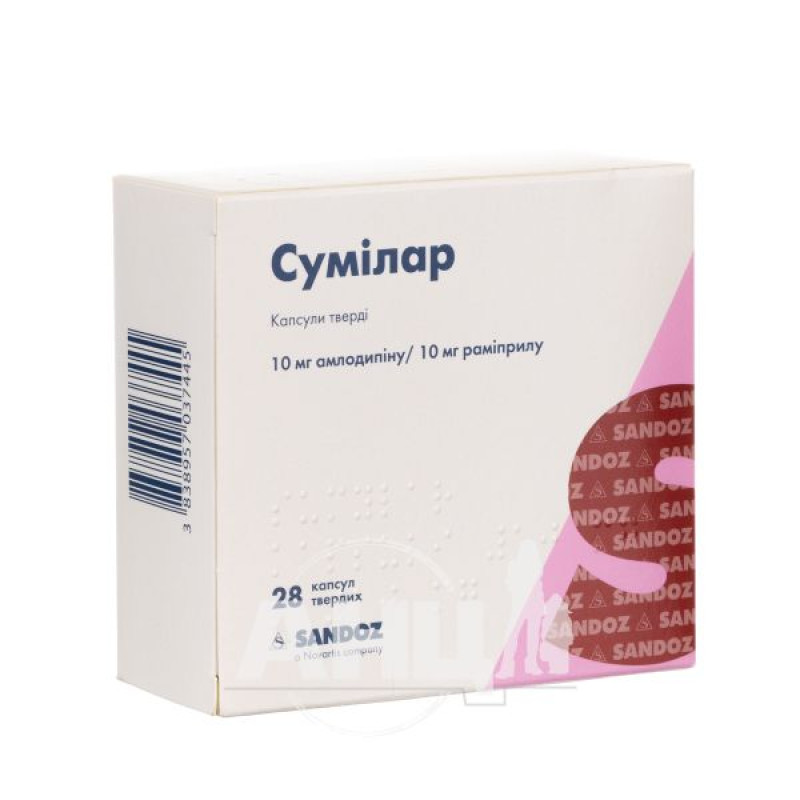Sumilar hard capsules 10 mg + 10 mg blister No. 28

Sumilar capsules are indicated for the treatment of hypertension in patients whose blood pressure is adequately controlled by individual drugs, administered simultaneously at the same dose as in the combination, but as separate tablets.
Composition
Active ingredient: amlodipine besylate, ramipril;
1 hard capsule contains: 5 mg / 5 mg 6.934 mg amlodipine besylate equivalent to 5 mg amlodipine free base and 5 mg ramipril or 10 mg / 10 mg 13.868 mg amlodipine besylate equivalent to 10 mg amlodipine free base and 10 mg ramipril, or 10 mg / 5 mg 13.868 mg amlodipine besylate equivalent to 10 mg amlodipine free base and 5 mg ramipril, or 5 mg / 10 mg 6.934 mg amlodipine besylate equivalent to 5 mg amlodipine free base and 10 mg ramipril;
Excipients:
Capsule contents: microcrystalline cellulose, calcium hydrogen phosphate anhydrous, corn starch, corn starch low moisture, sodium starch (type A), sodium stearyl fumarate; Capsule shell 10 mg / 5 mg 5 mg / 5 mg 5 mg / 10 mg titanium dioxide (E 171), gelatin, red iron oxide (E172); Capsule shell 10 mg / 10 mg yellow iron oxide (E 172), red iron oxide (E172), black iron oxide (E172), titanium dioxide (E 171), gelatin.Contraindication
Concomitant use of aliskiren-containing products in patients with diabetes or moderate or severe renal impairment (glomerular filtration rate (GFR) <60 ml/min/1.73 m2). History of angioedema (hereditary, idiopathic or previous angioedema with ACE inhibitors or angiotensin II receptor antagonists). Extracorporeal treatment that results in blood coming into contact with negatively charged surfaces. Significant bilateral renal artery stenosis or stenosis of the renal artery to a solitary kidney. Pregnancy or planning to become pregnant. Hypotensive or haemodynamically unstable condition. Severe hypotension. Shock (including cardiogenic shock). Obstruction of the outflow tract from the left ventricle (e.g. severe aortic stenosis). Hemodynamically unstable heart failure after acute myocardial infarction. Children. Hypersensitivity to amlodipine, dihydropyridine derivatives, ramipril or any other ACE inhibitors (ACE), or to any of the excipients of the drug. The combination of sacubitril / valsartan increases the development of angioedema.Method of application
The recommended daily dose is one capsule.
Sumilar should be taken once a day, at the same time of day, with or without food. The capsules should be chewed or crushed.
Fixed combination is not acceptable for initial therapy.
If dose adjustment is necessary, the dose of Sumilar can be changed or individual titration of the components of the drug can be considered. The capsules should be taken with sufficient liquid (e.g. drinking water).
Application features
Pregnant women
Contraindicated.
Children
Contraindicated.
Drivers
Caution is recommended, especially at the beginning of treatment and when changing the dosage.
Overdose
Symptoms associated with overdose of ACE inhibitors may include excessive peripheral vasodilation (with marked hypotension, shock), bradycardia, electrolyte imbalance and renal failure. The patient should be closely monitored. Treatment should be symptomatic and supportive. Supportive measures include initial detoxification (gastric lavage, administration of absorbents) and measures to restore hemodynamic stability, including the use of alpha-1 adrenoceptor agonists or angiotensin II (angiotensinamide). Ramiprilat, the active metabolite of ramipril, is slightly removed from the general circulation by hemodialysis.
Side effects
Ramipril.
The most common adverse reactions with ramipril are hyperkalemia, headache, dizziness, hypotension, orthostatic hypotension, syncope, cough (non-productive cough), bronchitis, sinusitis, shortness of breath, gastrointestinal inflammation, indigestion, abdominal pain, dyspepsia, diarrhea, nausea, vomiting, rash, particularly maculopapular, muscle cramps, myalgia, chest pain, fatigue. Serious adverse reactions include agranulocytosis, pancytopenia, myocardial infarction, angioedema, vasculitis, bronchospasm, acute pancreatitis, hepatic failure, acute renal failure, hepatitis, exfoliative dermatitis, toxic epidermal necrolysis, Stevens-Johnson syndrome, and erythema multiforme.
Amlodipine.
The most common side effects of amlodipine treatment are drowsiness, dizziness, headache, palpitations, hot flashes, abdominal pain, nausea, ankle swelling, edema, and fatigue. Serious side effects include leukopenia, thrombocytopenia, myocardial infarction, atrial fibrillation, ventricular tachycardia, vasculitis, acute pancreatitis, hepatitis, angioedema, erythema multiforme, exfoliative dermatitis, and Stevens-Johnson syndrome.
Interaction
Concomitant use of aliskiren-containing products is contraindicated in patients with diabetes or moderate or severe renal impairment (glomerular filtration rate (GFR) <60 mL/min/1.73 m2).
Storage conditions
Store at a temperature not exceeding 30 °C.
Store in original packaging.
Shelf life - 3 years.
There are no reviews for this product.
There are no reviews for this product, be the first to leave your review.
No questions about this product, be the first and ask your question.



